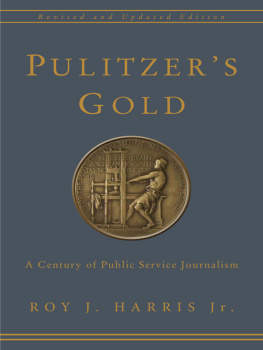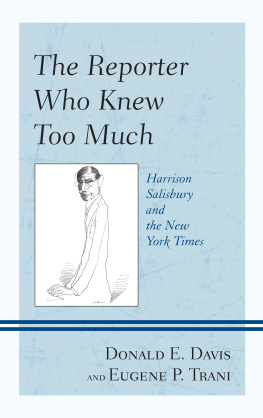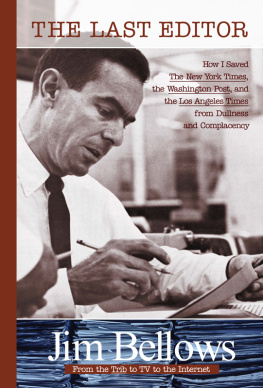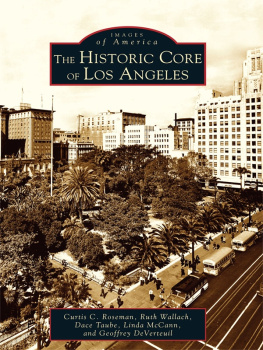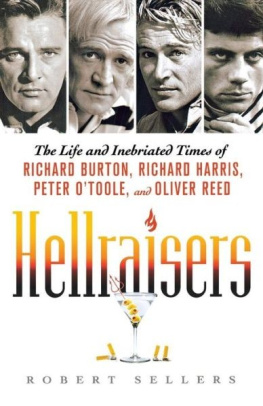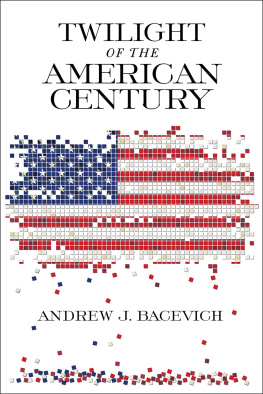Pulitzers Gold
PULITZERS GOLD
A Century of Public Service Journalism
Revised and Updated Edition
Roy J. Harris Jr.
Columbia University Press
New York
Columbia University Press
Publishers Since 1893
New York Chichester, West Sussex
cup.columbia.edu
Copyright 2016 Columbia University Press
All rights reserved
E-ISBN 978-0-231-54056-8
Library of Congress Cataloging-in-Publication Data
Harris, Roy J., 1946
Pulitzers gold: A Century of Public Service Journalism, revised and updated edition / Roy J. Harris, Jr.Revised and updated edition
pages cm
Includes bibliographical references and index.
ISBN 978-0-231-17028-4 (cloth: alk. paper) ISBN 978-0-231-17029-1 (pbk.: alk. paper) ISBN 978-0-231-54056-8 (e-book)
1. JournalismAwardsUnited States.
2. Pulitzer PrizesHistory. I. Title.
PN4798.H37 2016
071'.3079dc23
2015016644
A Columbia University Press E-book.
CUP would be pleased to hear about your reading experience with this e-book at .
COVER DESIGN: Archie Ferguson
COVER IMAGE: Used by permission of the Pulitzer Prizes
References to websites (URLs) were accurate at the time of writing. Neither the author nor Columbia University Press is responsible for URLs that may have expired or changed since the manuscript was prepared.
To journalists who will mine Pulitzers gold in the future and those who have gone before. And in memory of one in particular: my dad.
CONTENTS
This new edition of Pulitzers Gold makes me grateful on a whole new level. First, for the readersjournalists, nonjournalists, students, and teacherswho urged me to keep researching these exemplary stories. I especially appreciate how they encouraged me to use the 2016 centennial of the Pulitzer Prizes as a platform for heralding the future of public service journalism while honoring the past. Second, my thanks go to Columbia University Press and editor Philip Leventhal for bringing Pulitzers Gold home to the school Joseph Pulitzer chose to administer his prizes.
The original forces behind Pulitzers Gold stayed as strong as ever: my wife, Eileen Carol McIntyre, and my sisters, Ann OKeefe Brewer and Judy Wolman. My sons Dave and R.J. and the spirit of their mom helped me keep my focus on youthful readers. My stepson, Jesse Laymon, and his wife Vicki promoted that goal too. I lament the passing of so many original supporters, notably John S. Carroll and Bill Thomas of the Los Angeles Times, Selwyn Pepper and Wayne Leeman of the St. Louis Post-Dispatch, Bob Greene of Newsday, and Gerald Boyd, Jim Naughton, and Ben Bradlee. I miss them, but their faith in this work still nurtures me.
The backing of the Poynter Institutewhich first came from Jim Naughton and Karen Dunlapremains my bedrock in the era of Tim Franklin. Bill Blundell, bureau chief extraordinaire from my Wall Street Journal years, returned to help me rinse the manuscript clean of clichs. (Sorry, Bill.) And Bob Woodwards support continued to inspire me for this edition.
At the Pulitzer Prizes, outgoing administrator Sig Gissler; his successor, Mike Pride; and Edward M. Bud Kliment all granted me generous access to the archives and made me feel a part of their prestigious Pulitzer club. And, of course, there is no Pulitzers Gold without the many journalists who shared their golden stories with me. I am honored and privileged to be able to continue retelling them.
The centennial of the Pulitzer Prizes in 2016 casts a new light on the journalism that is honored with their most coveted award: the gold medal for meritorious public service. Through all the changes that a century has wrought within news organizationschanges both technological and culturalwinners of this one annual Pulitzer Prize have continued to exemplify an eternal force in quality reporting: the drive to dig for the truth and present that truth persuasively to a publications audience.
With so much uncertain about the future of journalism today, the study of these stories behind the stories still has tremendous value. The back stories offer lessons in public service reporting at the highest level and show how society benefits from that reporting. They show how journalists are adjusting their approach to fit new times and new technologies. Plus, as pure newsroom adventures, they make exciting and rewarding reading.
This new edition of Pulitzers Gold adopts a celebratory tone, as befits 100th birthday recognition. Twenty-first-century winners get the most attention while the decades of interplay between the Pulitzers and history become an even stronger theme.
The 2014 Pulitzer Gold Medals certainly represented a case of the media and history intertwined. One prize was awarded to the Washington Post and another to the Guardian-U.S. website for the public service of analyzing government documents that detailed extreme and hidden levels of administration surveillance of American citizens. Controversy still rages over the Post and Guardian-U.S. working with stolen material, leaked separately to their news organizations by the former National Security Agency contractor Edward Snowden. The Post and Guardian-U.S. reporting recalled the prize awarded in 1972 to the New York Times for its work analyzing Daniel Ellsbergs stolen, secret Pentagon Papersin that case recounting the deception of the public by several administrations related to Vietnam policy. That honor to the Times long has been considered among the Pulitzers finest moments.
Among other landmark Public Service Prizes in this century was another to the Post in 2008 for graphically exposing shameful conditions for injured war veterans at Walter Reed Army Medical Center. That work still resonates as other Veterans Administration scandals have arisen. Two Gulf Coast newspapers, the Times-Picayune of New Orleans and the Sun Herald of southern Mississippi, not only survived but thrived by serving their communities during the worst American hurricane season on record: 2005s summer of Katrina. And the Boston Globes shocking exposure of priests as sexual predators and a cover-up of their crimes by the Catholic hierarchy has continued to ignite Church investigations and reforms since that 2003 Pulitzer was awarded.
Going further back, the most famous gold medal of all is arguably the best known of the Pulitzer Prizes: the Washington Posts 1973 prize honoring the Watergate coverage led by Bob Woodward and Carl Bernstein. But usually the Pulitzer links to history are more obscure, even if their effect was powerful. As early as 1921, the now-defunct Boston Post won for exposing Charles Ponzi as a financial charlatan. Its reporting made the Ponzi scheme a metaphor for the get-rich-quick mania of the Roaring Twenties while helping coin a popular term for a type of fraud we still know today.
The books focus on this stellar reporting from the past has won Pulitzers Gold fans among journalism teachers. Many scholars have argued that aside from the Watergate era and the muckraking period, there was little investigative reporting taking place in the 20th century, wrote Indiana Universitys Gerry Lanosga in one review of the original edition. Harriss research reveals that investigative reporting has been a persistent force in American journalism, though he does not remark upon that important finding. So let me remark here: Yes, this century of Pulitzer winning by news organizations proves that public interest journalismusually by teams of reporters and editorshas powerfully served communities and remains a potent force for good.

